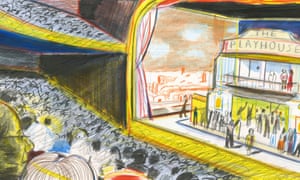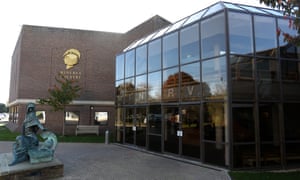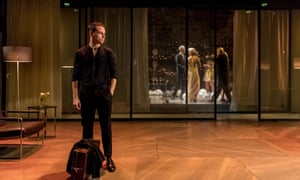David Hare: My ideal ‘theatre…new years even wished from one of Britain’s most popular playwrights.

In 1946, George Orwell wrote his last essay for the Evening Standard. He described an imaginary pub, the Moon Under Water, where the music was quiet enough for conversation, the bar staff knew all the customers’ names and where you could always get a cut off the joint and a jam roll for three shillings.
For my whole life, I have dreamed of having all my plays done at a theatre which, sadly, exists only in my mind, although the important elements of it, happily, exist in many.
Location
The ideal theatre – let’s call it the Playhouse – will not be in the centre of London. It will be in a place where people actually live. That means either a regional city or a residential district in the capital. From 1957, Roger Planchon’s exemplary Théâtre de la Cité (which became the Théâtre National Populaire in 1972) thrived in Villeurbanne, a defiantly working-class suburb of Lyon. Offering a programme rich with Racine and Molière, it rooted itself as deeply as Joan Littlewood’s Theatre Workshop did in Stratford East in London. But when, in 2001, the Almeida followed Planchon’s example by transplanting itself to the grottiest street in the old King’s Cross, where audiences were regularly approached by prostitutes and criminals, somehow the mix of art and grime didn’t graft.
Jonathan Meades is right when he argues that supporters of the arts like to exaggerate the effects of cultural regeneration. The prosperity of the Almeida in Islington at the end of the last century lifted the whole area. But it doesn’t always work. As Meades says, in the two decades “after the Guggenheim fell from the sky in Bilbao … the number of people unemployed or dependent on welfare has risen …” You can see something similar in my home town on Bexhill-on-Sea. The tasteful redevelopment of the De La Warr Pavilion, with its displays of cutting-edge conceptual art, has had little or no impact on the genteel charity-shop poverty of the streets around it. But it’s impossible to shake the idea that you can’t call anything a city unless it has a railway station, a bookshop, a post office and a working theatre. If you travel across the US through countless towns where the only bookshops are either pornographic or religious, and where there is absolutely nothing in between, then you will find yourself missing what spoilt metropolitans take for granted: mainstream culture.
Playing space
The Minerva in Chichester is one of the best-designed theatres in the UK, because it has a huge playing space for epic plays, and yet the audience’s experience is extremely intimate. But fine as it is, it’s still a black box, and very few black boxes carry history. They wipe themselves clean with each production. A theatre is partly memory, the residue of the greatness that’s passed through. If you are my age, then whenever you go to the Aldwych theatre, you will be moved to remember Paul Scofield playing King Lear, or Peggy Ashcroft playing Queen Margaret. At the Royal Court, you are in a space where Caryl Churchill, John Osborne, Andrea Dunbar and Athol Fugard offered their most original work. In St Petersburg, it’s impossible to visit the Alexandrinsky without being awed at the thought that you are sitting where The Seagull was first seen.

Certain theatres elevate plays, just by their atmosphere. In the late 1960s, a brilliant group of young people including Jenny Harris and Ruth Marks commandeered a Victorian schoolroom up a side alley not far from Brighton’s seafront to present a spontaneous slate of anarchist and communist plays. It only seated 80 people, but I never saw a show at the Brighton Combination which I didn’t enjoy. But atmosphere is very hard to re-create. Clearly the Brooklyn Academy aspired, in its Majestic auditorium, to transport the magic of Peter Brook’s Bouffes du Nord in Paris for the transatlantic premiere of The Mahabharata in New York in 1987. But however assiduously they scraped the paint off the proscenium, and however rakishly they degraded the naked brickwork, the chi-chi effect was, and remains, disastrous. Nothing is worse than fake authenticity.
The danger of magical spaces is that plays may fall far short of expectations. Recently, I sat through a pretentious flop at the Royal Court thinking a flop in that beautiful house must be the most lowering experience any audience anywhere can have.
Size
This is difficult. People brought up in a world of film and television expect to be close to the action. They expect to be able to hear every word and see every gesture. Rightly, they resent the class structures of playhouses built with wildly differing perspectives at different prices. But a playwright needs to live. Unfortunately, you may be extremely well known for your prestigious achievements in tiny studio theatres while also being stony broke. That’s why dramatists move off quickly to television. If, like Jez Butterworth, you have the skill and energy to write a play which reaches to the hearts of 800 people at once, then the complex response of a large audience enriches the experience.
Policy
The primary purpose of the Playhouse will be to do new plays, and these plays will represent and reflect the society they are performed in. There will be no need for gender or racial quotas, either on stage or off, because, by definition, if the artistic director follows this governing policy, then everything good will follow. More than half the plays will be by women, women will gloriously people the stage, and the vibrant multiculturalism of the society we inhabit will be in front of you in its variety and abundance. Recently, the director of the Intiman in Seattle said that theatres needed to celebrate ‘“people standing in their own identities”. What a grisly idea! I feel the exact opposite. Theatres need to represent people reaching out across their own identities.
The artistic director will be under 30, because only the young can regenerate the form. The less contaminated he or she is by what is already thought to be good, the better. But, best case, she will want a sprinkling of classics – Schiller, Ibsen, O’Neill – so that new plays may be seen in the context of old, with the aim of both paying tribute to a tradition and advancing it. When a production is of lasting value it will enter the repertory. In the UK, we are amazingly careless with our best productions. They should not be thrown away so lightly. Andrew Scott will play Hamlet at the Playhouse annually for a season. Lesley Sharp will reprise her Helen in A Taste of Honey.

Staffing
Everyone in the theatre will work towards what happens on stage. What’s more, they will often attend it. There is no artistic sight more depressing in London than the flow of staff leaving the National Theatre at 6pm. Many theatre organisations are over-full with people who have nothing directly to do with putting on plays.
In his book A Sense of Direction, the one-time director of the Royal Court, Bill Gaskill, tells of sitting one afternoon, alone and thoughtful, in the circle of the theatre, while Elsie, the cleaning lady, worked below. When an actor burst into the stalls, Elsie hushed him with the words: “You have to be quiet. Tonight’s a very important opening for Bill.” It was a perfect example of a theatre where everyone, including the cleaner, was committed and working to one purpose. But commitment should work both ways. That’s why Ariane Mnouchkine, the director of the Théâtre du Soleil, was often found tearing tickets as the audience came in to the Cartoucherie in Paris.

In return for this largesse, the Playhouse will tour, and tour often. The abandonment of touring by our best-funded companies is a major scandal which goes unremarked year after year. The argument that it is elitist to take metropolitan productions to the regions and that the regions are better off making their own work is phooey. The two should coexist, and should cross on the motorway.
Briefly, in the 1990s, an office was designated at the National Theatre called the Writer’s Room where a number of dramatists all worked on their current projects. Howard Brenton, Tony Harrison and Tony Kushner would all come in at 10am and take the milk bottles in. For once, writers were a genuine part of the life of the theatre, not just visitors to rehearsals. Needless to say, our office soon got taken away for some more bureaucratic purpose. But while it lasted, it was heaven. The Playhouse will have a writer’s room.

Workshops and readings
All plays submitted will be read. This will be guaranteed. But out-loud readings will be extremely rare, and only with the writer’s consent. A young playwright complained to me recently that she had been commissioned to write a play for a well-known address. When she finished it, the artistic director said it needed a workshop. The dramatist thought it didn’t. The writer’s wishes were overruled and the workshop went ahead, evidence of nothing but the management’s bad faith. In some theatres, workshops and readings are regularly deployed as stalling devices by artistic directors who pretend they are interested in new plays, but who use uncertainty and hesitation in staging them as a means of extolling and abusing their power. At the Playhouse, workshops and readings will never be dangled as hurdles a writer has to jump. In short, there will be genuine equality between actor, writer and director.
Actors
Certain actors will be associated with the Playhouse. Audiences have lost one of the pleasures of theatregoing – the link between particular houses and particular actors. You can rarely expect at any current venue to see the progress and versatility of a single actor. A new generation of enlightened agents will explain to their clients that a big theatre success is more likely to fulfil their dream of Hollywood stardom than playing fifth banana in a new soap.
Audience
There will be no targeting of individual productions towards individual ethnicities or age groups. Such policies are demeaning, and misunderstand the nature of art. Black people go to Picasso shows and white people go to see Basquiat. Angels in America plays as powerfully to straight people as it does to gay. When Ralph Fiennes played The Master Builder, a white play by a white 19th-century playwright, the Old Vic was packed to the rafters with a wildly diverse audience, because everyone, whatever their race, age and gender, wanted to see a great actor command a great role. Sharon D Clarke recently used the Cy Coleman musical, The Life, to rock every nationality known to humanity at the Menier Chocolate Factory. At the Playhouse, people will go to the work because it’s good, not because it’s ingratiating.

Site-specific
If a director can produce a very strong argument, then she or he will be allowed to present a play away from the Playhouse. But this will not happen often. When Patrice Chereau staged In the Solitude of the Cotton Fields in a disused factory outside Paris, then the dust and the light made Koltès’s text sparkle. Jerzy Grotowski’s use of an empty film studio for Stanisław Wyspiański’s play Akropolis added to the desolation of that extraordinary evocation of the concentration camps. But gimmicky stagings inside gasholders or behind supermarkets will be discouraged. There are sound democratic reasons for theatre usually taking place in spaces where everyone can see, hear, think and feel together.
Critics
Because they exist to serve the audience, critics will be outsiders, not panting wannabe insiders. They will know as much about the outside world as they do about theatre. The primary context for judging the play will be real life. They will resist the facile temptation to give dramatists, directors and actors a diagnostic report on their status within the fluctuations of their own art form. Critics will review plays, not reputations. Above all, they will be able to write English. Those critics who cannot construct a halfway readable sentence in their native language will not be invited to review work at the Playhouse.
laying space
The Minerva in Chichester is one of the best-designed theatres in the UK, because it has a huge playing space for epic plays, and yet the audience’s experience is extremely intimate. But fine as it is, it’s still a black box, and very few black boxes carry history. They wipe themselves clean with each production. A theatre is partly memory, the residue of the greatness that’s passed through. If you are my age, then whenever you go to the Aldwych theatre, you will be moved to remember Paul Scofield playing King Lear, or Peggy Ashcroft playing Queen Margaret. At the Royal Court, you are in a space where Caryl Churchill, John Osborne, Andrea Dunbar and Athol Fugard offered their most original work. In St Petersburg, it’s impossible to visit the Alexandrinsky without being awed at the thought that you are sitting where The Seagull was first seen.

Certain theatres elevate plays, just by their atmosphere. In the late 1960s, a brilliant group of young people including Jenny Harris and Ruth Marks commandeered a Victorian schoolroom up a side alley not far from Brighton’s seafront to present a spontaneous slate of anarchist and communist plays. It only seated 80 people, but I never saw a show at the Brighton Combination which I didn’t enjoy. But atmosphere is very hard to re-create. Clearly the Brooklyn Academy aspired, in its Majestic auditorium, to transport the magic of Peter Brook’s Bouffes du Nord in Paris for the transatlantic premiere of The Mahabharata in New York in 1987. But however assiduously they scraped the paint off the proscenium, and however rakishly they degraded the naked brickwork, the chi-chi effect was, and remains, disastrous. Nothing is worse than fake authenticity.
The danger of magical spaces is that plays may fall far short of expectations. Recently, I sat through a pretentious flop at the Royal Court thinking a flop in that beautiful house must be the most lowering experience any audience anywhere can have.
Policy
The primary purpose of the Playhouse will be to do new plays, and these plays will represent and reflect the society they are performed in. There will be no need for gender or racial quotas, either on stage or off, because, by definition, if the artistic director follows this governing policy, then everything good will follow. More than half the plays will be by women, women will gloriously people the stage, and the vibrant multiculturalism of the society we inhabit will be in front of you in its variety and abundance. Recently, the director of the Intiman in Seattle said that theatres needed to celebrate ‘“people standing in their own identities”. What a grisly idea! I feel the exact opposite. Theatres need to represent people reaching out across their own identities.
The artistic director will be under 30, because only the young can regenerate the form. The less contaminated he or she is by what is already thought to be good, the better. But, best case, she will want a sprinkling of classics – Schiller, Ibsen, O’Neill – so that new plays may be seen in the context of old, with the aim of both paying tribute to a tradition and advancing it. When a production is of lasting value it will enter the repertory. In the UK, we are amazingly careless with our best productions. They should not be thrown away so lightly. Andrew Scott will play Hamlet at the Playhouse annually for a season. Lesley Sharp will reprise her Helen in A Taste of Honey.

Staffing
Everyone in the theatre will work towards what happens on stage. What’s more, they will often attend it. There is no artistic sight more depressing in London than the flow of staff leaving the National Theatre at 6pm. Many theatre organisations are over-full with people who have nothing directly to do with putting on plays. Many are forced into something thankless called development, trying desperately to get indifferent private sponsors to perform the state’s duties. The National has roughly twice as many employees as it had when it opened on the South Bank in 1976 in order to do fewer productions. Many of them never look up from their desks. They are forced to stare all day at computers, ticking boxes on forms sent to them by the Arts Council. At the Playhouse, computers will be centrally shut down at 4.30pm, so everyone can turn their attention to the night’s work.
In his book A Sense of Direction, the one-time director of the Royal Court, Bill Gaskill, tells of sitting one afternoon, alone and thoughtful, in the circle of the theatre, while Elsie, the cleaning lady, worked below. When an actor burst into the stalls, Elsie hushed him with the words: “You have to be quiet. Tonight’s a very important opening for Bill.” It was a perfect example of a theatre where everyone, including the cleaner, was committed and working to one purpose. But commitment should work both ways. That’s why Ariane Mnouchkine, the director of the Théâtre du Soleil, was often found tearing tickets as the audience came in to the Cartoucherie in Paris.

The state
In the late 1980s, Peter Hall said: “The great experiment is over.” Since he was born in 1930, he said he had seen the birth of the welfare state, and of the notion that government was responsible for the decent standard of life of its citizens. If the state was a benign enabler, then it would cheerfully enable art, health and education. This belief was uncontested by all political parties for a 40-year consensus which, in theatre, saw both company and repertory flourish, because they were affordable. Only with the arrival of the Thatcherites did representatives of the state – themselves lavishly rewarded by the state; Thatcher happily lived off public money – begin to deny their responsibilities. By starving theatre of funds, they forced the subsidised sector to adopt the values of the commercial. As Peter Gill wrote, after Look Back in Anger in 1956, the RSC’s calculated investment in Les Misérables in 1985 was the most influential theatre event of the postwar period. Unfortunately, the musical reversed all the advances made by the Osborne play. It turned subsidised theatre into a shouty seedbed.
The Playhouse will be subsidised by the state alone.
Touring
In return for this largesse, the Playhouse will tour, and tour often. The abandonment of touring by our best-funded companies is a major scandal which goes unremarked year after year. The argument that it is elitist to take metropolitan productions to the regions and that the regions are better off making their own work is phooey. The two should coexist, and should cross on the motorway. The Ferryman, Consent, Ink and Mosquitoes should all be out on the road right now, so the whole country can see them. The work of Newcastle’s Live Theatre and Theatr Clwyd should be regularly coming to town.

School
In an annexe of the Playhouse, beside the canal, will be a small school, where, in addition to acting, students will be taught theatre’s vital skills – stage management, scene painting, costume design – by the same people who work in the Playhouse. Apprentices and practitioners will mix freely.
Workshops and readings
All plays submitted will be read. This will be guaranteed. But out-loud readings will be extremely rare, and only with the writer’s consent. A young playwright complained to me recently that she had been commissioned to write a play for a well-known address. When she finished it, the artistic director said it needed a workshop. The dramatist thought it didn’t. The writer’s wishes were overruled and the workshop went ahead, evidence of nothing but the management’s bad faith. In some theatres, workshops and readings are regularly deployed as stalling devices by artistic directors who pretend they are interested in new plays, but who use uncertainty and hesitation in staging them as a means of extolling and abusing their power. At the Playhouse, workshops and readings will never be dangled as hurdles a writer has to jump. In short, there will be genuine equality between actor, writer and director.

Site-specific
If a director can produce a very strong argument, then she or he will be allowed to present a play away from the Playhouse. But this will not happen often. When Patrice Chereau staged In the Solitude of the Cotton Fields in a disused factory outside Paris, then the dust and the light made Koltès’s text sparkle. Jerzy Grotowski’s use of an empty film studio for Stanisław Wyspiański’s play Akropolis added to the desolation of that extraordinary evocation of the concentration camps. But gimmicky stagings inside gasholders or behind supermarkets will be discouraged. There are sound democratic reasons for theatre usually taking place in spaces where everyone can see, hear, think and feel together.